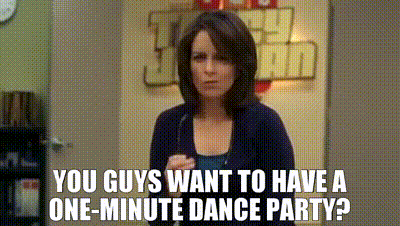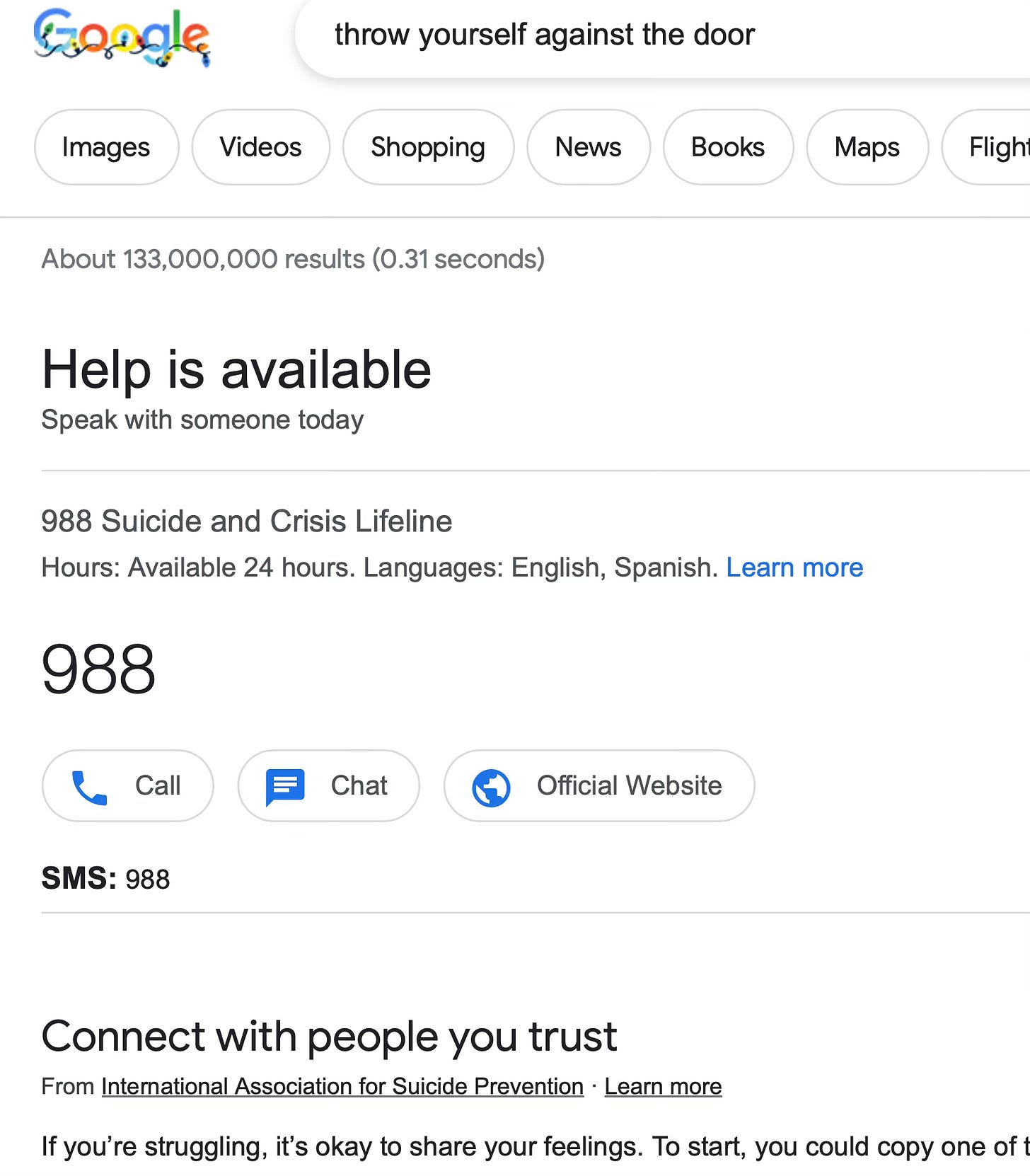What happens first: motivation/inspiration or work?
Wrong. It’s work.
“Action creates motivation,” some therapist is saying right now.
I wish I had a “writing routine” and a “creative process.” Those sound nice. But often I attack each day differently and haphazardly and based on what’s making me the most anxious. Every day feels like starting over. Sometimes I have to take a nap after I wake up. The moment I face the blank page, I realize I have nothing to say and begin to cry/panic.
I also wish that MFA school taught writers how to sit in a chair — or that it takes years to develop a writing practice and even more years to develop writing skills and discipline, and still more years to develop a self and then a self who writes (and then the wisdom to know the difference), and a few more years just to figure out how to sit still and be bored and break up with the Internet and feel inspired with no inspiration and type until you’re writing.

What comes first: writing or a writing practice?
Wrong. It’s women.
This I know for sure: writers must figure out how to physically write before they can write well or anything at all. A writing practice is as much a skill as revision, especially if you’re the type of writer who must write before you know what you’re writing about.
When I can remember what to do to get what’s trapped in my head onto the page, here’s what I do and don’t do:
The Pomodoro Method
Write a to-do list by breaking up a project into 25-minute increments, e.g.
write bad first paragraph
revise
research
read
revise
Download a Pomodoro app (I use Be Focused) or set a physical timer for 25 minutes. Do one task at a time (“single-task”).
When the timer dings, stop.
An easier way to get back into the work is to stop in the middle so you don’t have to begin again from scratch.
If stopping in the middle is not right for you, then break at a point where you’re excited and not fatigued — then you’ll be excited to come back rather than dread it/feel exhausted by it.
Take a 5-minute break. Stand up. Podcasts on success also advise:
Look out the window and into the distance to refresh your eyes. Blink quite a bit.
Drink water over caffeine because water is better for stamina.
Eat healthy snacks (e.g. blueberries) to keep up your energy.
You think you want to eat sugar, but you do not!!!!!!!
Do a one-minute dance party. Exercise does something to the blood that does something to the brain that makes it go.
After the fourth Pomodoro, break for 30 min.
This is loose. Often I break for a lot longer than 5 minutes.
Set a goal number of Pomodoros.
Also loose. Some days my goal is 5 Pomodoros, and that takes me 24 hours. If I’m on deadline and willing to hurt myself, then I can score up to 12 Pomodoros. Over 12 Pomodoros is a medical emergency. Many days I’m lucky if I get one Pomodoro.
Don’t write all day.
Again, have LOWEST EXPECTATIONS.
Aim for one Pomodoro per day vs. “write all day.”
I get more done in 25 minutes than in 8 hours, because if I have 8 hours to write, then I will masturbate for 8 hours.
Have a lot going on? Break up the work day. On chaotic days, I spend one Pomodoro on each:
administrative bullshit
life garbage
real writing
teaching
editing
Once I get emails and other bullshit out of the way, then I can focus on creative work. Once I’m drained from creative work, then I can switch into a more automatic mode of updating lectures and reminding students to delete all their adverbs.
I do my whole life in Pomodoros and live in 25-minute increments. Even my dog is on the Pomodoro Method.
Read.
Reading is the pregame to writing. Read before you write and when you can’t write. Get inspired/excited/in the best possible mindset to want to write. Give your brain a boner.
Count reading as one Pomodoro.
Make it small.
Writing issues are often anxiety issues. To reduce anxiety and feeling overwhelmed, make tiny plans and have teeny goals.
If I take on too much, then I avoid or crash. I used to say, “I must finish this book TODAY.” Now I say, “I’ll work on the book for 25 minutes and see what happens.” I trick myself (and talk to myself). At my most anxious, I’ll say, “I’ll just revise yesterday’s paragraph for 25 minutes and then quit until tomorrow.”
I’m not afraid of 25 minutes. I’m afraid of the whole day. I’m afraid of “having to finish.” And once I set the timer for 25 minutes, often I can’t stop because what I needed to write was to get over the anxiety to write.
Make it easy.
One school of advice is to “eat the frog,” which means to do the hardest task first, to get it out of the way. The opposite works for me.
I begin with the easiest task, e.g. fill in an outline; finish a paragraph or even a sentence I started yesterday — to beat my anxiety at its own game.
This is how I “get in alignment” and feel like I don’t hate writing because it’s too hard.
Work in the margins.
Forget “romantic ways” to write, e.g. in a cabin by a lake in springtime. Write on the subway or in the waiting room before an appointment or while waiting for your ice cream to be delivered or while the chicken bakes or before the edible kicks in.
Use a planner.
Plan in reverse.
Organize days/time counting back from deadlines since nothing is ever “done”; it is only “due.”
Rather than work a lot the day(s) before the deadline, work a little for many days/weeks/months before the deadline.
Preserve energy.
We have a finite amount. And decision fatigue is real (so wear the same writing outfit, which is a robe, every day).
Don’t blow your creative wad on emails or sexts (or scrolling or envy). Save your good sentences for your work and a larger audience.
I’ve written beautiful books in unpublished emails to audiences of one, people I was trying to convince to love me but who never did for WHATevER reason. WHAT A WASTE.
To save hours, let caps lock do all your screaming for you.
Forget willpower; block the godforsaken Internet.
Per podcasts, willpower is a myth. Break a bad habit by making it inconvenient.
First, identify your bad-habit triggers. Mine are social media, the phone, and straightwhitecismen—all keep me small, shallow, anxious, frantic, competitive, unproductive, horny, and sad. Next, block all of those things.
Keep the phone in another room, or put it in your mailbox or in this timed lock box for snacks.
Leave the house without the phone and go to a café and don’t bring your charger in order to artificially impose terror of time running out and tip the baristas 50%.
Turn off wifi before you want to check it/get sucked in. Download blocker apps:
Freedom disables Internet.
Freedom 2 disables Internet on phone, too.
You can also set a daily schedule, e.g. turn off the Internet M-F from 1pm to 4pm.
SelfControl blocks distracting websites only so you can use Google Docs, Wikipedia, and that’s it — everything else is too distracting.
Meditate.
This works; sorry.
Our thoughts are too loud/mean and are spreading rumors about us and our writing. Oprah said something like, Your soul is quiet and your mind is loud, so we must work on quieting our loud-ass mind to hear and transcribe what our soul says.
Meditation apps to increase concentration:
Calm
Headspace
Mindfulness
Oprah and Deepak Chopra’s 21-Day Meditation Experience (my favorite; don’t @me)
How to start again tomorrow:
A writer I met on Tinder told me to do this, and I did it and wow, he’s not the asshat I thought he was. Write “ENTER HERE” on a Post-It; draw a door if you’re an artist; apply the Post-It to a draft, etc., on the spot you left off so you know exactly where to start again without confusion or agony.
Hot tip: If you’re a writer, then don’t date other writers. It’s not worth whatever productivity hacks they may have.
Figure out what works for you.
Read about other writers’ disciplines and processes. Try them on and keep what works for you.
Read craft books, and check out Uses This and Famous Writing Routines.
Do you write best at 7am or 9pm or 2am? Honor your tendencies and know that you don’t need to change your life or yourself to write.
“…anyone who tells you that you have to be a certain way to be a writer, that you have to live a certain life, that you have to see the world or that you have to lock yourself away, that you have to abandon your people or that you have to love your people, that you have to suffer or that you have to forget your suffering, whatever, it’s all bullshit. You have to write. You have to submit. You have to persevere. You have to throw yourself against the door. That’s it.” —Stephen Marche, On Writing and Failure
Probably don’t throw yourself against a door tho (men and their violent metaphors lol)
Law of attraction:
Figure out what the law of attraction is, and do that.
How do you sit in a chair? What are your productivity hacks? Have you been productive since reading this email? Do you date writers? If so, how?
ICYMI: I’m Elissa Bassist, and I teach short conceptual humor/satire writing, funny personal essays, tragicomic memoir, emotional emails, and that’s it. I edit the “Funny Women” column on The Rumpus, and I wrote the award-deserving book Hysterical.
Smash:
Smash, or I’ll think you’re mad at me:
Consider smashing “paid” because I’m building something here and could use your support.
And smash that heart button to help people in the Substack Multiverse find this newsletter.








Taking a nap after I wake up has been highly effective for me lately.
Constantly trying to give my brain a boner